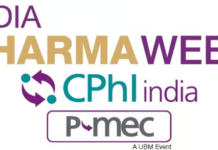New Delhi, April 27, 2016: Shri J P Nadda, Union Minister of Health & Family Welfare announced India’s first public-private-partnership (PPP) agreement for research and innovation in preventive health between ICMR and Sun Pharma, here today. Presiding over the signing of this agreement by Dr. Soumya Swaminathan, DG, ICMR and Shri Dilip Shanghvi, Managing Director of Sun Pharma, Shri J P Nadda noted that this unique initiative was a significant step in the health sector and reiterated the commitment of the Government to strengthen health research in the country. Speaking on the occasion of the celebration of World Malaria Day, the Union Health Minister added that this collaboration will prove to be a notable milestone in the Government’s strategy to eliminate Malaria from the country. India is party to the commitment at the East Asia Summit for malaria elimination by 2030, so today’s announcement of malaria elimination demonstration project is of special significance, Shri Nadda pointed out.
Noting that Malaria is a major public health problem, and Malaria endemic countries have shown significantly lower rates of economic growth, the Health Minister informed that as part of the partnership, ICMR and Sun Pharma will establish a malaria elimination demonstration project- ‘Malaria Free India’ to support the National Framework for Elimination of Malaria which was announced by the Health Ministry in February 2016. The demonstration project shall be launched first in Mandla, one of the most malaria endemic districts of Madhya Pradesh. Sun Pharma will fund as well as execute this malaria elimination programme over a span of 3 to 5 years covering over 200,000 households in Mandla district. Implementing Malaria elimination demonstration project in a high transmission district of Mandla, using proven case management and vector control strategies, will be done in collaboration and through the support of the Government of Madhya Pradesh. The project aims to reduce the morbidity and mortality caused by malaria as well as prevent re-introduction of malaria, strengthen the existing health systems, introduce mobile-based surveillance systems and treat all malaria cases as per National Vector Borne Disease Control Program (NVBDCP) guidelines, and mobilise communities. The lessons learned would be used for elimination of malaria from the country under the national program, the Minister added. He further stated that as the PPP initiative will dovetail into Swachh Bharat Abhiyaan goals, the benefits shall be magnified.
To demonstrate the feasibility of eliminating malaria and prevention of re-establishment of this disease, ICMR and Sun Pharma will use rapid diagnostic tests (RDTs) and antimalarial drugs (ACTs), long-lasting insecticide treated bednets and indoor residual spray (IRS).
In addition, as part of the PPP, ICMR and Sun Pharma will jointly conduct scientific research for development and testing of medical products (including drugs, biosimilars and vaccines) as well as undertake disease control and elimination programs. They will set-up a Joint Working Group (JWG) to identify and collaborate in disease surveillance and elimination that are relevant to India. Both will expand cooperation in the area of translational health sciences research with the objective of developing new and improved medicines for infectious and chronic diseases. They will jointly work to strengthen capacity and facilities required for conducting research and trials aimed at testing safety and efficacy of medical products. They will also work with other stakeholders in creating public awareness through accurate and research-based information exchange as part of their shared belief that knowledge of clinical safety and effectiveness of medicines is best determined through well-designed, scientifically robust, ethically conducted clinical trials. Acknowledge the need to establish systems for appropriate oversight of human clinical trials, the agreement covers capacity-building through basic and applied research collaborations, expert consultations, training, exchange of scientists, sharing of repository materials, strengthening of laboratory quality assurance systems and transfer of technology.
Shri Jual Oram, Union Tribal Affairs Minister, stated that he represents a malaria-infested district in Odisha. He further said that in many tribal areas of the country, the incidence of malaria is very high, which seriously affects the productivity of the communities. Shri Jual Oram appreciated this special PPP initiative of the ICMR as a major step towards its fight against the vector borne diseases in the country.
Shri Narottam Mishra, Health Minister, MP, pointed out that of the 13 malaria affected districts, Mandla is the worst affected. He said that this PPP project is integrally tied up with the Swacchtta Abhiyaan and will also create awareness about keeping the environment clean.
Elaborating on the salient features of the PPP, Dr. Soumya Swaminathan, DG, ICMR stated that there is an urgent need for translational health in India and India must forge partnerships for drugs and treatment strategies for diseases that affects it the most. Malaria elimination development project is one such step in the right direction. She further stated that the tools we have today are competent to make a huge difference this includes drug combinations and newer generation of insecticides. However, we need to be watchful and careful, she added. She highlighted the challenge of diverse geographical areas in India and expressed hope that other pharma companies and private sector will partner with the government to work in the health sector.
Shri Dilip Sanghavi, MD, Sun Pharma, mentioned that the focus of the PPP is to use the global knowledge in elimination of Malaria. He further added that the idea is to begin from Mandla, where the incidence of malaria are high, and learn from the experience and leverage the knowledge to draw strategies for larger geographical areas.
Also present in the function were Dr. Jagdish Prasad, DGHS, Professor, M C Mishra, Director, AIIMS and other senior officers of ICMR and the Health Ministry.






















